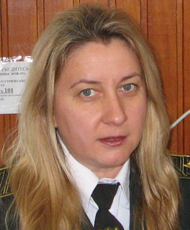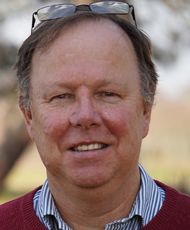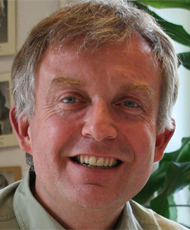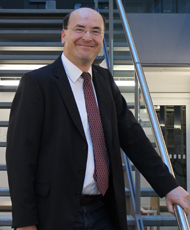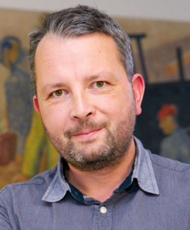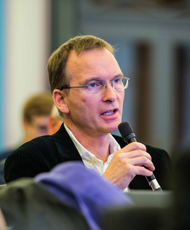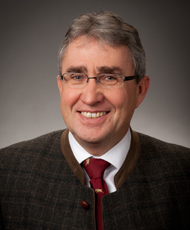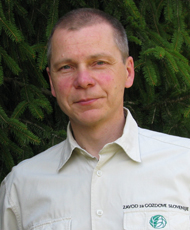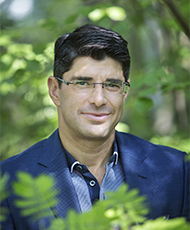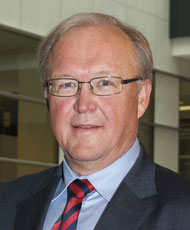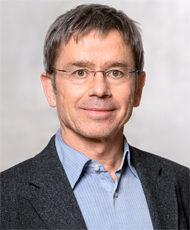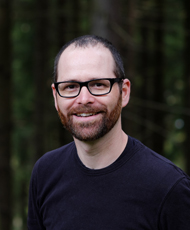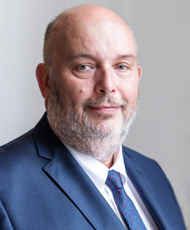|
Kateryna Davydenko is a senior researcher at the Department of Forest protection, Ukrainian Research Institute of Forestry & Forest Melioration where she manages a variety of forest health-related issues including impacts of invasive species, their biology, movement within international trade, and mitigation strategy. Her primary research interest is the forest pathology: forest infectious diseases and pests; methods of prediction and pest risk assessment; development of measures on preventing the spread of pathological phenomena. From 1996 to 2018 she worked at Ukrainian Forest Protection Service, as head of Department of the Biological control forest pests and later on as head of Eastern Division of Ukrainian Forest Protection Service. She is also Docent and Lecturer of Forest Pathology and Entomology at the Department Biotechnology and Aquatic Recourses of Kharkov Zoological Academy. She has trained 16 Masters Students and has published over 60 scientific papers, several book chapters, many abstracts, and several reports for the general public. Most of her current work focuses on both indigenous and alien invasive pathogens and insects. She currently is working on various projects focused on reducing the risk of invasive forest pests and pathogens. |
|
|
Louise Eriksson is an Associate professor in psychology and currently work as a researcher in environmental psychology at Umeå University and Kristianstad University. Her research focuses on attitudes and behaviors in the environmental domain more broadly and natural resource management, including forests and wildlife, more specifically. During a four-year project, she examined the social dimensions of managing old and new forest disturbances (e.g., climate change) including analyses from the perspective of private forest owners as well as the general public. Her work has covered the perceptions of different stakeholder groups to provide insights for policy and practitioners. |
|
|
Barry Gardiner is a senior researcher at EFI Planted Forests Facility with an interest in risks to forests. His special interest is wind damage to forests and he developed a forest wind risk model that has been adapted for use in many countries. From 1987 to 2011 he worked at Forest Research in Scotland on wind risk to forests and the influence of forest management on timber quality. From 2011 to 2015 he worked as a Senior Scientist at INRA Bordeaux on a 4 year scientific package entitled “Wind Damage to Forests in a Changing Climate: Impacts and Mitigation”. He currently is working on various projects focussed on multiple risks to forests and how to incorporate risk management into forest management practice. He is Associate Editor of Annals of Forest Science and Frontiers in Forests and Global Change, and Coordinator of IUFRO Group 8.03.06 “Impact of wind on forests”. He is author on more than 100 scientific papers, and has edited 3 books. |
|
|
Christoph Hartebrodt is the head of the department of Forest Economics and Management of the Forest Research Institute Baden-Württemberg (Germany). His department covers all topics and methods needed for modern and successful management of forest enterprises. He is also lecturer at the Faculty of environment and natural resources, University of Freiburg, where he completed his doctorate in the early ninetieth. He is initiator and leader of the German network for adaption, risk- and crisis management in forest ecosystems and contributed to the idea of a European Forest Risk Facility in various ways. He served as consultant after numerous catastrophic events in various European countries. He is coordinator of the IUFRO group 3.08 Small Scale Forestry and member of the committee for forest economics of the German Council for Forestry. |
|
|
Thomas Haußmann, a German forestry expert, holds a B.Sc. in Forestry from the Technical University of Göttingen. He works at present in the international forestry department of the German Federal Ministry of Food and Agriculture and his working fields include areas such as forest ecosystem services, in particular nature conservation, forest dieback and International and European forest policy. Mr. Haußmann returned to Germany a couple of years ago after finishing a secondment to the Permanent Representation of Germany to the FAO in Rome, where he represented his country at the Committee on World Food Security (CFS) and at FAO. Mr. Haußmann is the German representative at the EFI Council and was in charge of negotiating the setup of the EFI office in Bonn/Germany. |
|
|
Tomáš Hlásny is senior researcher at the Czech University of Life Sciences in Prague. His research focuses on climate change effects on forest growth, carbon cycle and ecosystem services as well as forest adaptation to climate change. He is particularly engaged in understanding of disturbance regimes of central European forests and in how they interact with forest management and climate change. Tomáš Hlásny has also a 15-year working experience from the National Forest Centre, organization of the Ministry of Agriculture and Rural Development of the Slovak Republic, where he was active in the transfer of research knowledge to forest management and climate change policies. He participated in a number of international projects such as CECILIA, ARANGE, FORMIT and CarpathCC.
|
|
|
Marcus Lindner is Principal Scientist in the Resilience Programme at the European Forest Institute. He holds a degree in forest sciences from University of Freiburg and a PhD in Geoecology from University of Potsdam in Germany. Marcus has 25 years of experience in research on climate change impacts, adaptation and mitigation strategies in forest management, forest sector sustainability, and forest resource assessments and ecosystem service provisioning from European forests. His work often targeted the science-policy-practice interface and included several policy support studies for different DGs. |
|
|
Reinhardt Neft is the Managing Director of the Bavarian State Forest Enterprise since 2005. As Managing Director he is responsible for the department of silviculture, nature conservacy, forest protection, hunting and fishing, the human resources department, the IT department and for 22 forest departments as well. Before 2005 he worked on different positions at the Ministry of Agriculture and Forestry in Munich, Bavaria, He was appointed as the President of the European State Forest Association (EUSTAFOR) in March 2019. |
|
| Damjan Oražem has been employed in various fields at the Slovenian Forest Service (SFS) for the past 25 years. Since the end of 2013 he is the director of this SFS which has more than 700 employees, and in addition to functions in the public interest, it actively works on international projects and certain market activities. The basic function of the SFS is to direct the development of forests of all ownership through forest management and hunting planning and advising forest owners in the fields of forestry, forestry, education of owners and the public. In the last five years, SFS has been a key organization for the successful rehabilitation of very extensive natural disasters in forests.
|
|
| Marc Palahí is the Director of the European Forest Institute and responsible for leading the organisation towards an acknowledged pan-European science-policy platform. Previously he led EFI’s policy support activities and during this time was instrumental in launching ThinkForest, a European high-level science forum on the future of forests. He has also worked as Head of EFI’s Mediterranean Facility, EFIMED. He has a PhD in forestry and economics and an MSc in forestry engineering.
|
|
|
Tomáš Pařík is acting as a Chairman of the Board in the company Wood & Paper. Wood & Paper is one of the leading company in wood procurement area in Central Europe supplying some of the key wood consuming businesses in the region. Tomas is long term active in several business and forestry related associations. He is currently Vice Chairman In Association of forestry and wood working industry in the Czech Republic and he is as well representing Czech Republic in Brussels based Confederation of European Pulp and Paper Industry, dealing with forestry and raw material questions. |
|
|
Göran Persson served as Prime Minister of Sweden from 1996 to 2006 and was the leader of the Swedish Social Democratic Party from 1996 to 2007. Since leaving office, Mr Persson has been a consultant for the Stockholm-based PR firm JKL. He is also a Member of the Board of the World Resources Institute, and the President of the European high-level forum on the future of forests, ThinkForest, facilitated by EFI. |
|
|
Stefan Rahmstorf has a PhD in oceanography and has worked at the Potsdam Institute for Climate Impact Research since 1996. His work focuses on the role of the oceans in climate change. In 1999 Rahmstorf was awarded the $ 1 million Centennial Fellowship Award of the US-based James S. McDonnell foundation. Since 2000 he teaches Physics of the Oceans as a professor at Potsdam University. Rahmstorf is a member of the Academia Europaea and served from 2004-2013 in the German Advisory Council on Global Change (WBGU). He was also one of the lead authors of the 4th Assessment Report of the IPCC. In 2007 he became an Honorary Fellow of the University of Wales and in 2010 a Fellow of the American Geophysical Union. In 2017 he was the first scientist outside the US to be awarded the Climate Communication Prize of the American Geophysical Union.
|
|
|
Rupert Seidl is professor of forest ecosystem management and deputy head of the institute of silviculture at the University of Natural Resources and Life Sciences (BOKU) Vienna, Austria. His research focuses on understanding how climate and disturbances affect forest ecosystem dynamics, and on applying this knowledge towards increasing the robustness of forest management in a changing world. He has authored more than 80 SCI-listed publications on this topic in the last 15 years, including influential work in journals such as Nature Climate Change and PNAS. Rupert Seidl is the holder of a prestigious START grant of the Austrian Science Fund, and was elected into the Austrian Academy of Sciences in 2015. |
|
|
Miroslav Toman has been the Minister of Agriculture in the Czech Republic since June 2017. He studied at University of Life Sciences Prague where he got his Master of Science degree. He started his professional practice as a livestock specialist in a cooperative farm. He has been devoted to agriculture in most of his jobs both in private sector and in public area. Between years 2002 – 2006 he worked as a deputy to Minister of Agriculture, from July 2013 to January 2014 he became the Minister of Agriculture in Caretaker Government. From 2007 to 2017 he was the President of Federation of the Food and Drink Industries of the Czech Republic. |
